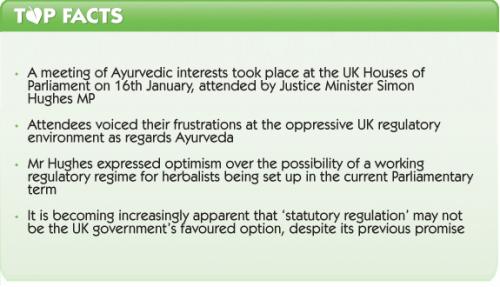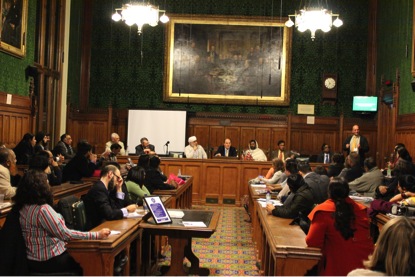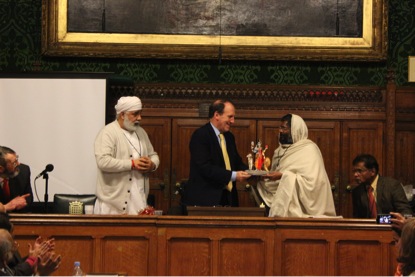The ancient Indian traditional ‘science of life’, Ayurveda, is under enormous regulatory threat in the UK – along with other non-European traditional systems of medicine. Last Thursday, at a well-attended meeting in the UK Houses of Parliament organised by campaign group Save Herbal Medicine, Justice Minister Simon Hughes promised action to safeguard Ayurveda.

The Ayurvedic dilemma
Across the European Union (EU), and in the UK in particular since the advent of the Traditional Herbal Medicinal Products Directive (THMPD; Directive 2004/24/EC), Ayurveda is caught on the horns of a dilemma. On the one hand, the THMPD is manifestly unsuited to regulating the manufactured herbal formulations that lie at the heart of so much Ayurvedic practise – a fact recognised by the European Commission itself in its 2008 experience report, COM(2008) 584 final. At the same time, there is no regulatory scheme in place – in the UK or any other EU Member State – for practitioners of Ayurveda. A sticky and frustrating situation indeed for the UK Ayurvedic community.

Panel and attendees at the 16th January Ayurveda meeting at the UK Houses of Parliament. Panel members, left to right: David Whitley (Ayurvedic Trade Association), Dr Geoffrey Mead (Vice President of Ayurvedic Practitioners Association), Amarjeet S Bhamra (Save Herbal Medicine), Simon Hughes MP, His Holiness Dr Vasanth Vijay Maharaj (Jain Guru from Tamil Nadu), Dr Shantha Godagama (Herbal Medicines Advisory Committee member), Dr Palitha Serasinghe (Course Leader of Ayurvedic Medicine at Middlesex University).
Frustrations voiced
As observed more than once at a meeting convened by Amarjeet S Bhamra, of campaign group Save Herbal Medicine at the Houses of Parliament on Thursday 16th January, the UK government’s promise to regulate herbal practitioners has failed to materialise – while attendant difficulties have multiplied. Speakers expressed their frustrations with the regulatory situation and extolled the widespread benefits of Ayurveda for all manifestations of disease, and especially the chronic conditions for which orthodox medicine has no answers.
Justice (Minister) for herbal medicine!
With the government seemingly backing away from its previously stated commitment to SR, an air of expectancy preceded the arrival of Simon Hughes MP, the recently appointed Secretary of State for Justice. Fortunately, his address was refreshingly optimistic. He acknowledged the depth and richness of Ayurvedic tradition, while declaring that “I have long been persuaded that the activities within the health service and health provision, and the activities of people who are...propagating their practises in ways that are offering health remedies and health improvement [and which are] core activities and well-established activities, ought to be regulated.”
Continuing, Mr Hughes referred to the seemingly endless procession of reports, working parties, proposals and consultations that has brought us to where we are today: on the verge of yet further working group discussions on the topic of herbal practitioner regulation. He suggested that the government may wish to legislate for some form of herbalist regulation in the current Parliamentary term, with a general election confirmed for 7th May 2015. This may be possible only because secondary legislation will be required, and not the more time-consuming primary legislation.
Benefits to society
Mr Hughes’ third key point concerned what he sees as the wider benefits to society of herbal practitioner regulation: “It is in the interests of the consumer...to know who is a recognised practitioner, valid and validated. It’s in the interests of the profession that other people don’t appear and promote themselves and do so unjustifiably, which damages those [practising responsibly].” He also believes that research efforts will benefit from a regulated profession. All this must be viewed, warned Mr Hughes, through the prism of the EU, which wants common regulatory standards across all EU Member States.
Hang on a minute...
All of which sounds resoundingly positive – and in many ways, it is. It cannot do any harm to the cause of regulation of herbal practitioners, of every stripe, to have someone as influential as Mr Hughes onside. However, we must strike a note of caution.
Firstly, we have of course been here before – many times, as Mr Hughes himself pointed out. It may be that things are different this time, and a government nobly burdened by disquiet over consistent delays to herbalist regulation pulls the cat out the bag before the May 2015 general election. It will have its work cut out: the working group's final report isn't due until March 2015. On the other hand, the “time-honoured politician’s technique of the infinite consultation” may be refined yet further by some unforeseen circumstance. Only time will tell.
Secondly, although all the talk at last week’s meeting was about SR, the signs are that SR is no longer the favoured option. The government has already declared that its originally intended route to SR conflicts with EU legislation – although we have seen nothing to convince us that this is actually the case. Government correspondence to working group invitees raises the possibility of simpler voluntary self-regulation as an alternative to SR. And we suspect that only voluntary self-regulation would permit regulation to be in place by 2015.
Finally, the MHRA is overseeing the working group along with the DH – indicating that the group’s terms of reference will be centred around herbal products, rather than herbal practitioners.

His Holiness Dr Vasanth Vijay receiving Ayurved Ratan Award from Simon Hughes MP and Amarjeet S Bhamra.
The ANH-Intl ‘roadmap’ for safeguarding herbal medicine
Taking all the above into account, we believe that the following strategy provides the best way to ensure a viable future for herbal medicine in the EU:
- Create a safe harbour for botanical food supplements, as distinct from herbal medicines of the type regulated by the THMPD
- Support moves toward voluntary self regulation of herbal practitioners in the UK
- ANH-Intl judicial review of sale as food supplements of long-standing products from traditional systems of medicine
- EU-wide framework for traditional medical systems, as foreseen by experience report COM(2008) 584 final.
Conclusion
Herbal medicine is at a crossroads both in the UK and throughout the EU. Sensible and proportionate regulation of herbalists – of all traditions – and herbal products is of vital importance to the millions of EU citizens involved in or reliant upon the entire sector. We await the outcome of the working group discussions with enormous interest.
With thanks to Amarjeet S Bhamra for organising the 16th January meeting and for providing photographs for this article.








Comments
your voice counts
22 January 2014 at 6:49 pm
My famiy has used herbs as part of our everyday living for over four generations. We see no reason for government regulations to be put in order to regulate that which has provided us with our health. Without side effects.
23 January 2014 at 12:48 pm
Thank you Adam for this useful report and for reminding me of the ANH view of the broader p;icture. One point is that I think that if a specials scheme does emerge that it must be a 'traditional product' scheme not a 'herbal' scheme because of trhe importance of non-herbal ingredients in health care traditions other than the western tradition.
07 March 2014 at 11:13 am
During the July 2013 House of Commons, debate minister said that the traditional use of herbal medicine continues under section 3 2012. The traditional format he referred to was he compilation of prescriptions by the herbalist in his/her clinic for a specific patient. This traditional practice has also been respected by the MHRA, to cover the use of fresh, dried or ground herbs. They can be used in their natural state, as a decoction, tea or in tincture or put into capsules by the practitioner. The practitioner blends the prescription. As this does not involve an industrial scale process and is THMPD except.
The fixation on unlicensed, industrially manufactured products, using biochemical ingredients in a balance and concentration, neither of which occur in nature, is little more than a stalking horse to destroy herbal medicine and deliver it into the hands of the pharmaceutical industry.
The minister suggested changing the licensing arrangements for manufactured products, to relieve them of much of the cost involved under the current interpretation of THMPD. In the report “Review of the Balance of Competences between the United Kingdom and the European Union Health July 2013”, this was described as a "national competency" and would mirror the licensing arrangements already used in other EU countries to circumnavigate this problem. I provided photographic evidence or pre-formulated herbal prescriptions being sold together with medicinal claims, as to their use, and mixtures of ground herbal mixtures sold in capsule form, as food supplements (but without medicinal claims).
The adoption of the above strategy, or a separate licensing protocol as a national competency, would maintain reasonable access to commercially formulated mixtures, while maintaining the viability of traditional practice that is not dependent on these unnatural pre-formulations.
The government has clearly stated that SR would not give access to unlicensed herbal medicine products under EU regulation, so it really is time to drop that particular tunnel vision fixation. It is not, nor ever was, fit for purpose.
The example of unlicensed TCM products and the dangers they have demonstrated, through their substituted ingredients and heavy metal contamination, has proved the need for some form of licensing for public safety. The argument is therefore to keep licensing, but make it economically viable for the manufactures of the products concerned. This would square the circle without impinging on traditional practice that does not depend on pre-formulated manufactured products. This approach, not being dependent on the pre-regulation of any given tradition, would not discriminate against the multitude of traditions currently excluded under the proposed SR model. All that is needed is a modicum of lateral thinking, as proposed by the minister, but probably in need of development along the lines mentioned above. The main thing to remember is that SR is and always was a trap to sell out all herbal medicine, when the real challenge is THMPD in toto. A challenge to this EU directive is being prepared by the ANH and let us hope for its success.
Unless we leave the EU (praise God) there is no way the manufacturing industry will get away with not licensing its products. Such a proposal would be a public safety issue anyway, so working with a viable change in licensing is the best way forward to resolve this conundrum.
I hope this explanation is sufficiently lucid and compelling to win your understanding and agreement. I have been up to my neck in this issue for a number of years and fully realize that the hokum put forward by the EHTPA has been designed to panic people into compliance with its perverse objectives. Take away the smoke and mirrors and you will find a viable way forward, as described above.
Robert Scott
07 March 2014 at 7:10 pm
Hi Robert, and thanks for your comments. We'd just point out that, while you're quite correct about the position of Regulation 3(6) - the 'herbalists' exemption', formerly Section 12(1) of the 1968 Medicines Act - it may be seen as vulnerable because it lacks any specific public safety provisions.
The products you describe sound like they reflect the currently existing legal arrangements for herbal products. Those with medical indications are traditional herbal medicines, registered under the THMPD, and those without are botanical food supplements. If the products you photographed with indications didn't have a Traditional Herbal Registration (THR) number, then we'd agree with you that the authorities in that country are acting more leniently than the MHRA. Keeping the botanical food supplement regime as open and inclusive as possible is absolutely critical for widespread availability of many high-quality, safe and effective herbal products.
Thanks for your best wishes regarding the legal challenge! You might also be interested in our wider strategy for addressing the current problems with the EU herbal medicine legal framework: http://anhinternational.org/files/100916_ANH_Benefyt_abbreviated_position_paper.pdf.
Your voice counts
We welcome your comments and are very interested in your point of view, but we ask that you keep them relevant to the article, that they be civil and without commercial links. All comments are moderated prior to being published. We reserve the right to edit or not publish comments that we consider abusive or offensive.
There is extra content here from a third party provider. You will be unable to see this content unless you agree to allow Content Cookies. Cookie Preferences